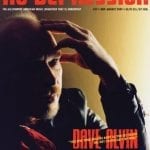Hit & Run Bluegrass – Lights out
At the Acoustic Cafe in Nederland, Colorado, a stuffed Jerry Garcia doll sits on the mantle watching over the crowd as a few dozen patchouli-scented men and women sip their microbrews and talk of upcoming summer tours. One young man with a full beard and a floppy hat walks around outside with a cup of tea and a didgeridoo. This is the bluegrass scene in Colorado, and the crowd is waiting for the state’s newest sensation — Hit & Run Bluegrass.
In saying that Hit & Run is the state’s “newest” sensation, one should also mention that with the possible exception of some anonymous family of pickers toiling away on a farm in southern Colorado, they’re also the youngest. Not Nickel Creek phenomenon young, but the kind of young you’d expect to find playing bars in Boulder instead of opening for Sam Bush and Hot Rize.
In 2002, after playing only a couple of gigs together, they entered the band competition at Rockygrass, an annual bluegrass festival in Lyons, Colorado. “It was really just for experience and exposure,” says Rebecca Hoggan, the bandleader and guitarist, and one of the vocalists. “We almost didn’t make the finals!”
But they did make the finals, and ended up winning. Eleven months later, they won the competition at the Telluride Bluegrass Festival, making them the only band to win both competitions. Much has changed since then; this year at Telluride, they’ll be playing with dobro legend Jerry Douglas.
While Hit & Run claims a “contemporary bluegrass” label, some further distinction is necessary. For instance, there is no Futureman, and there’s not a banjitar in sight. Furthermore, and to the possible dismay of some of their Boulder fans, their songs don’t usually last more than four minutes, with only tight, syncopated solos. Also, they treat every gig as a formal affair — the men in suits, the women in long dresses.
Hoggan became interested in flatpicking at college, where she double-majored in music, spending half her time on bluegrass and the other half on jazz. Guitarist Emily Remler was an early hero. “Women need to see other women excel instrumentally to know that they can do that too,” she says.
Hoggan began hitting bluegrass festivals across the country, meeting musicians along the way, and in 2000 she and college friend Todd Livingston moved to Boulder. Livingston had begun to master the dobro, and the two found various gigs in the area.
In 2001 she recorded the album Born In East Virginia (which she was) with some bluegrass heavyweights, including Darol Anger of the David Grisman Quintet. She was still straddling the line between jazz and bluegrass; the disc included three jazz standards. Finally Hoggan decided to devote herself to one style. She chose bluegrass and began to form a band.
At the time, Livingston was playing in a band with young mandolinist John Frazier. Hoggan soon met banjo player Aaron Youngberg, who knew an upright bassist from Wyoming, Erin Coats. In the summer of 2002, the five formed Hit & Run.
Back at the Acoustic Cafe, the crowd sits mesmerized watching the quintet hammer deftly through a number of originals, a few gospel tunes, and a version of Loretta Lynn’s “Don’t Come Home A Drinkin’ (With Lovin’ On Your Mind)” that highlights Hoggan’s Alison Krauss-like voice. This show is one of six parties celebrating the group’s debut release, Beauty Fades. In addition to seven originals (including Hoggan’s gospel-tinged title track), the album includes covers of Porter Wagoner’s “Lonely Comin’ Down” and George Jones’ “Old, Old House”, sung by bassist Erin Coats.
Hit & Run may struggle to describe their brand of bluegrass, but one thing is for certain when the power at the Cafe unexpectedly goes out in the middle of a song: They’re committed to staying the course. Not missing a beat, they finish the tune in almost total darkness, sans monitors and mikes. With the crowd still cheering, and the stage still dark, they begin to count off the next tune.




